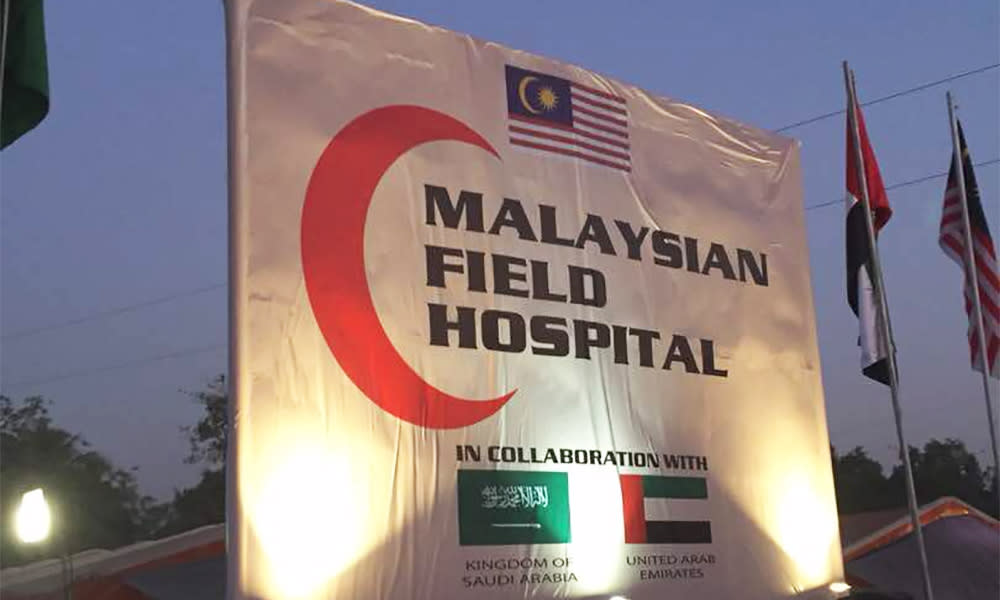Cox's Bazar field hospital closed, staff redeployed for Covid-19 battle

Malaysia decided to close the Malaysian Field Hospital (MFH) in Cox’s Bazar, Bangladesh for Rohingya refugees earlier than scheduled as it had achieved its objectives there and can redeploy MFH personnel to aid in the country's fight against Covid-19.
The MFH which was set up in November 2017 to provide critical humanitarian aid to Rohingya refugees who fled to Bangladesh from conflict in Rakhine, Myanmar, ceased its operation in March, over a year earlier than expected.
"Based on current developments, the government decided to end the MFH operation earlier in 2020 as compared to the original operational mandate which was to end in December 2021.
"The establishment of the MFH had succeeded in achieving its objectives and this withdrawal neither affects bilateral relations between Malaysia and Bangladesh nor the country's image," said the Defence Ministry (Mindef) in a statement today.
Mindef added that the repatriation of MFH medical personnel has enabled armed forces hospitals to operate at their full capacity nationwide.
"At the same time, they can be deployed locally as part of government efforts in combating the spread of the Covid-19 pandemic which is currently showing an upward trend," it said.
The ministry pointed out that there were six additional field hospitals established by the Turkey government and other international NGOs such as Mèdecins Sans Frontiéres (MSF), Hope Foundation, MSF Spain, Bangladesh Red Crescent Society, and Friendship which are located within the refugee camp.
"The increase in the number of field hospitals has given more options and access to healthcare services to Rohingya refugees and locals who have since reduced their dependency on the MFH which was located outside the refugee camp," it said.
Mindef added that as a responsible member of the international community, Malaysia is deeply concerned about the Rohingya humanitarian crisis and will continue to play a role in highlighting Rohingya issues at regional and international levels, including through bilateral and multilateral platforms, particularly in finding long-term solutions to these issues.

Through its operation, the MFH was manned by 56 personnel on a rotational basis which consisted of 20 armed forces officers, including eight physicians, 30 members of other ranks of the Royal Medical Corps, and six civilian nurses.
Until March this year, the armed forces sent five medical teams to the MFH.
In the initial stages of operations, the MFH became the primary focus for Rohingya refugees to seek treatment since it was the only field hospital capable of providing Level 3 services at that time, even though it was located outside the refugee camp, Mindef said.
Among the services provided were general surgery, orthopaedics, obstetrics and gynaecology, anaesthesia, x-rays, and other key treatments such as family health, emergency, dental and radiology as well as laboratory facilities.
"Throughout the MFH’s period of operation, the medical personnel were often exposed to health and safety risks, such as the spread of Covid-19 and the threat of other infectious diseases such as hepatitis, malaria, and tuberculosis as well as the increase in criminal cases among Rohingya refugees and locals," the ministry added.
During its operating period from November 2017 to March 2020, the total number of patients treated at the MFH was 108,038 people.
MFH personnel also performed more than 3,500 surgeries, including 900 high-risk operations. In November 2018, the number of patients per month had reached up to 8,763 people, which was the highest monthly number recorded since the MFH’s establishment.
"However, the total number of patients monthly had shown a downward trend, in which only 1,690 people sought treatment at the MFH in February 2020," Mindef said.
It added that Malaysia's resolve and the strong commitment of the medical team had enabled the MFH to gain the World Health Organisation's recognition as the best, most well-equipped, and most trusted Level 3 hospital, and subsequently became a referral hospital in the district.
"The downward trend in the number of cases and patient attendance was due to the stabilised situation in the refugee camp area, and the improved health conditions of the Rohingya refugees since chronic diseases had been treated and many surgical procedures were successfully performed," Mindef said.

